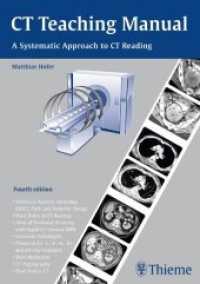- ホーム
- > 洋書
- > 英文書
- > Religion / Ethics
Full Description
Adab is a concept situated at the heart of Arabic and Islamic civilisation. Adab is etiquette, ethics, and literature. It is also a creative synthesis, a relationship within a configuration. What became of it, towards modernity ? The question of the "civilising process" (Norbert Elias) helps us reflect on this story. During the modern period, maintaining one's identity while entering into what was termed "civilisation" (al-tamaddun) soon became a leitmotiv. A debate on what was or what should be culture, ethics, and norms in Middle Eastern societies accompanied this evolution. The resilient notion of adab has been in competition with the Salafist focus on mores (akhlāq). Still, humanism, poetry, and transgression are constants in the history of adab.
Contributors: Francesca Bellino, Elisabetta Benigni, Michel Boivin, Olivier Bouquet, Francesco Chiabotti, Stéphane Dudoignon, Anne-Laure Dupont, Stephan Guth, Albrecht Hofheinz, Katharina Ivanyi, Felix Konrad, Corinne Lefevre, Cathérine Mayeur-Jaouen, Astrid Meier, Nabil Mouline, Samuela Pagani, Luca Patrizi, Stefan Reichmuth, Iris Seri-Hersch, Chantal Verdeil, Anne-Sophie Vivier-Muresan.
Contents
Contents
Preface
List of Figures and Tables
Notes on Contributors
Introduction
Catherine Mayeur-Jaouen
Part 1: New Formulations of adab in Modern Islam (Sixteenth-Nineteenth Century)
1 Adab, akhlāq and Early Modern Ottoman Paraenesis: Birgivī Meḥmed Efendī's (d. 981/1573) al-Ṭarīqa al-muḥammadiyya
Katharina Ivanyi
2 Mughal Early Modernity and Royal ādāb: Shaykh ʿAbd al-Ḥaqq Muḥaddith Dihlawī's Sufi Voice of Reform
Corinne Lefèvre
3 Adab and Scholarship Mirrored by Law: Reading Ibn ʿĀbidīn's Treatise Shifāʾ al-ʿalīl wa-ball al-ghalīl fī ḥukm al-waṣiyya bi-l-khatmāt wa-l-tahālīl
Astrid Meier
4 Arabic Encyclopaedias and Encyclopaedism between the Seventeenth and Nineteenth Centuries: Forms, Functions, Intersections of Adab and Modernity
Francesca Bellino
Part 2: Translations and Mediations in the Time of European Encounters (Nineteenth Century)
5 When Il PrincipeTravelled to Egypt: Translating Machiavelli in Nineteenth Century Cairo and the Cultural Politics of the Nation
Elisabetta Benigni
6 Changing Table Manners at the Court of the Khedives: Serving up a New adab for the Elite
Felix Konrad
7 Mirzā Qalīc Beg (1855-1929) and the Renewal of adabin a Peripheral Province of British India
Michel Boivin
8 Les nouveaux usages de l'adab: belles-lettres, bonnes manières et pratique des langues chez les représentants de la Porte ottomane
(XVIIIe-XXe siècle)
Olivier Bouquet
9 Un adab de classes moyennes. Normes sociales, culture et littérature dans la production réformiste arabe au temps de Jurjī Zaydān (1861-1914)
Anne-Laure Dupont
10 Adab as the Art to Make the Right Choice between Local Tradition and Euromania: a Comparative Analysis of Khalīl al-Khūrī's Way, idhan lastu bi-Ifranjī!(1859) and Aḥmed Midḥat's Felāṭūn Beğ ile Rāḳım Efendī (1875), or on the Threshold of Nationalizing Middle Eastern Culture
Stephan Guth
Part 3: Education and Emotions in the "Civilising Process" in the Middle East
11 Manfalūṭī (1876-1924), l'amour pur, et la critique sentimentale de la civilisation
Samuela Pagani
12 Entre « civilisation » et distinction, l'adab des missionnaires catholiques au XIXe siècle
Chantal Verdeil
13 Feminine or Masculine Adab? Education, Etiquette, and Ethics in Egypt in the 1900s-1920s
Catherine Mayeur-Jaouen
14 Civilising Teachers, Modernising the Sudanese: Colonial Education and "Character Training" in Postwar Sudan, 1945-1953
Iris Seri-Hersch
15 Manquer d'adab ou de taʿāruf dans l'Iran contemporain : deux enjeux différents ?
Anne-Sophie Vivier-Muresan
Part 4: Reformulating adab and Civilisation in Contemporary Islam (Nineteenth-Twentieth Century)
16 Un manuel d'adab et d'akhlāq pour les temps modernes: les Jawāmiʿ al-ādāb fī akhlāq al-anjāb de Jamāl al-Dīn al-Qāsimī (1866-1914)
Luca Patrizi
17 Yūsuf b. Ismāʿīl al-Nabahānī (m. 1932), adīb soufi au temps de la Réforme
Francesco Chiabotti
18 A Surrogate Aristocracy? Sufi Adab, Modernity, Rurality, and Civilisation in Ex-Soviet Central Asia
Stéphane A. Dudoignon
19 Arabic Writing and Islamic Identity in Colonial Yorubaland: Ilọrin and Western Nigeria, ca. 1900-1950
Stefan Reichmuth
20 La politique du commandement du bien et de l'interdiction du mal en Arabie saoudite
Nabil Mouline
21 Rāqī bi-akhlāqī. The Moral Turn—From Sufi Sheikhs to Facebook Groups?
Albrecht Hofheinz
Index








